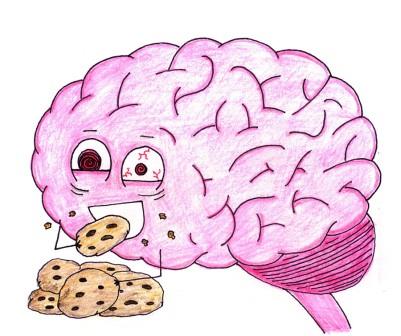Study: Brain training game helps resist unhealthy snack foods
.
Online game ‘may control snacking’ (BBC News):
“A computer game may help some people control their unhealthy snacking habits, suggests a small study from the University of Exeter.
The online game, developed by psychologists at the University of Exeter and Cardiff University, used “brain training” techniques to change behaviour — in this case, to resist unhealthy snack foods. It required people to avoid pressing a key when an unhealthy food appeared on the screen…The results showed that participants lost an average of 1.5lb (0.7kg) and consumed around 220 fewer calories a day during the week of training. Food diaries in the following six months suggested that the participants maintained their improved habits…
Dr Natalia Lawrence, from the University of Exeter, who led the research, said the game had the ability to change some people’s eating behaviour, but it was still early days. “… our findings suggest that this cognitive training approach is worth pursuing: it is free, easy to do and 88% of our participants said they would be happy to keep doing it.”
Study: Training response inhibition to food is associated with weight loss and reduced energy intake (Appetite)
- Abstract: The majority of adults in the UK and US are overweight or obese due to multiple factors including excess energy intake. Training people to inhibit simple motor responses (key presses) to high-energy density food pictures reduces intake in laboratory studies. We examined whether online response inhibition training reduced real-world food consumption and weight in a community sample of adults who were predominantly overweight or obese (N = 83). Participants were allocated in a randomised, double-blind design to receive four 10-min sessions of either active or control go/no-go training in which either high-energy density snack foods (active) or non-food stimuli (control) were associated with no-go signals. Participants’ weight, energy intake (calculated from 24‑h food diaries), daily snacking frequency and subjective food evaluations were measured for one week pre- and post-intervention. Participants also provided self-reported weight and monthly snacking frequency at pre-intervention screening, and one month and six months after completing the study. Participants in the active relative to control condition showed significant weight loss, reductions in daily energy intake and a reduction in rated liking of high-energy density (no-go) foods from the pre-to post-intervention week. There were no changes in self-reported daily snacking frequency. At longer-term follow-up, the active group showed significant reductions in self-reported weight at six months, whilst both groups reported significantly less snacking at one- and six-months. Excellent rates of adherence (97%) and positive feedback about the training suggest that this intervention is acceptable and has the potential to improve public health by reducing energy intake and overweight.)
To learn more:




You are right, playing challenging games sometimes keeps us away from unhealthy junk food. Right now I am playing a few interesting games and helps to focus on things other than food.